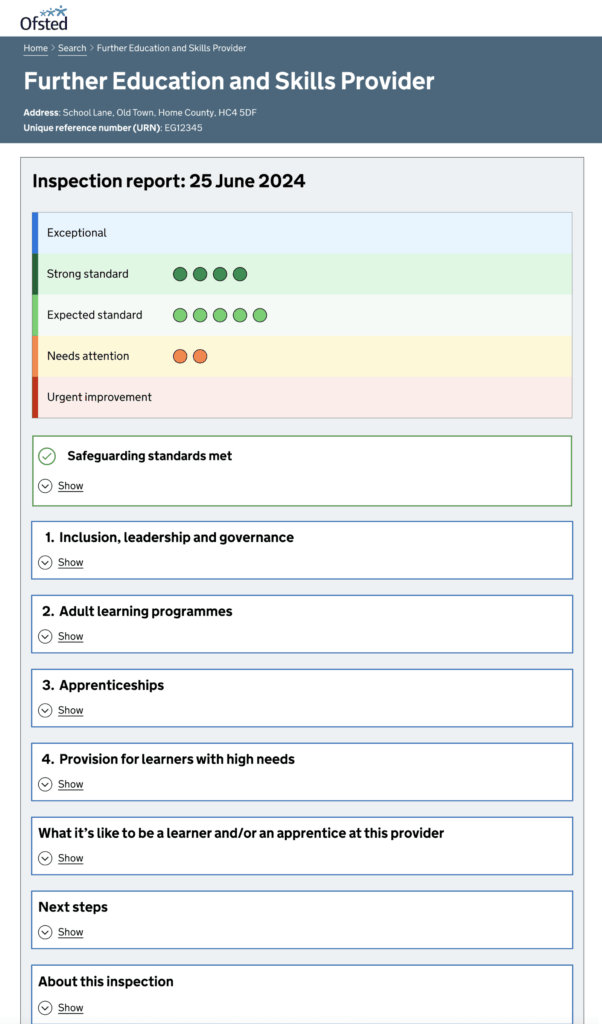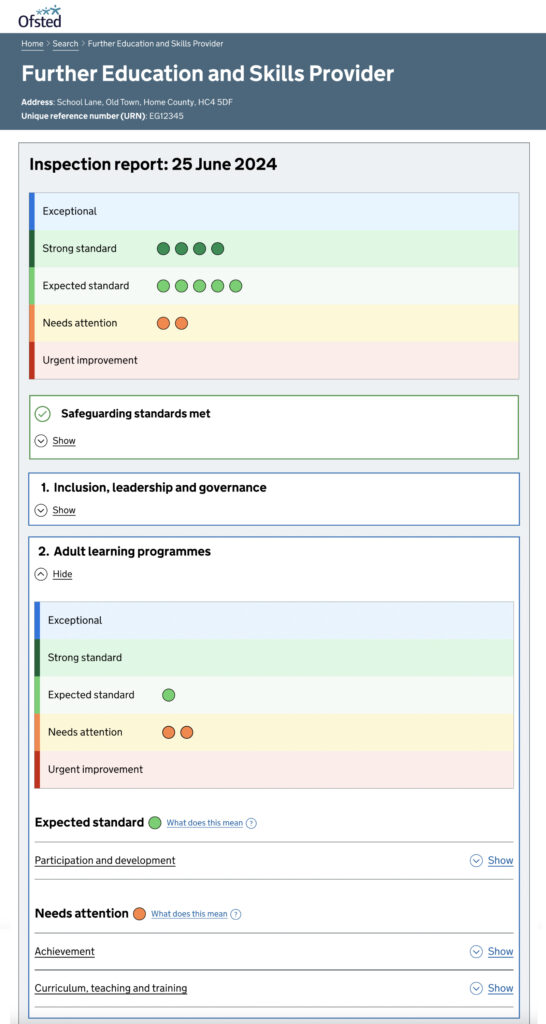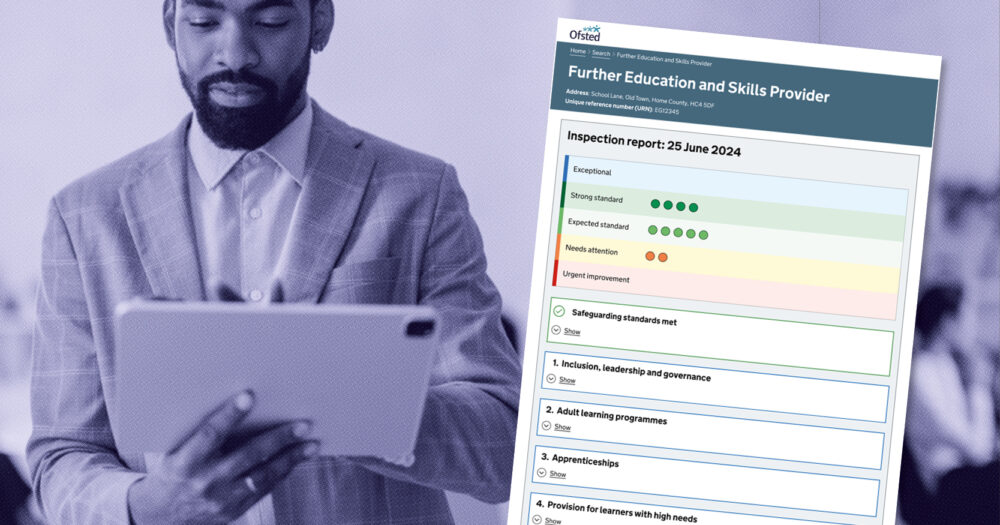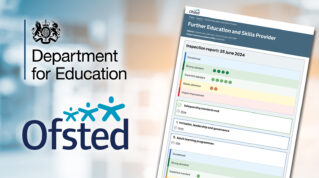Further education, apprenticeships and skills training providers will see more grades and more performance data in their inspection reports from November as Ofsted introduces its new-look report cards.
Chief inspector Sir Martyn Oliver set out to reform inspections with a bolstered focus on inclusion and teacher workload and report cards that better flag what providers do well and what needs to improve.
Ofsted received over 6,500 responses to its consultation on its reform proposals and has today announced its decisions affecting inspections from November.
Here’s your FE Week guide to the key decisions…
New grading scale
From November, familiar ‘outstanding’, ‘good’, ‘requires improvement’ and ‘inadequate’ grades will be replaced.
Ofsted will proceed with a new five-point grading scale, but the grade titles have changed from what was proposed in February.
Initially proposed replacement grades like ‘secure’ and ‘causing concern’ were “confusing” and “too harsh” on providers, according to consultation feedback.
The new scale will be: ‘exceptional’, ‘strong standard’, ‘expected standard’, ‘needs attention’, and ‘urgent improvement’.
Ofsted said their baseline expectations across the new inspection system are for the ‘expected standard’ grade. Anything below that will get you ‘needs attention or ‘urgent improvement’ and above will get you ‘strong standard’ or ‘exemplary’.
Plans to replace ‘outstanding’ with an elite committee-approved ‘exemplary’ grade have been ditched for being “too complex” and burdensome.
Instead, the ‘exceptional’ grade can be awarded in the same way as the other grades, by meeting the criteria set out in the toolkit (more on that below).
Providers receiving a ‘needs attention’ grade in their inspection will be subject to a one to two-day monitoring visit, but it’s not yet known how the new grades will trigger contractual or FE Commissioner intervention.
Alongside inspection grades, Ofsted’s new report cards for FE and skills providers will also feature performance data. This will include the 16-18 overall achievement rate, 19+ achievement rate, apprenticeship pass rate and apprenticeship overall achievement rate.

Reduced headline grades
Following the consultation, the maximum number of grades an FE and skills provider can be awarded under new inspections has reduced from 20 to 16.
Consultation respondents said Ofsted’s original proposals for up to 20 could be “difficult to manage”.
Report cards will now list and explain three grades per provision-type, rather than the proposed four. Planned curriculum and developing teaching and training grades have been merged.
So a large further education college with programmes for young people, programmes for adults, apprenticeships and high needs will get three grades for each type of provision: curriculum, teaching and training, achievement and participation and development.
Colleges and designated institutions will continue to be graded on ‘contribution to skills needs’, but this will now be graded on Ofsted’s five-point scale, rather than the current, ‘limited’, ‘reasonable’ and ‘strong’ scale.
Alongside those, each inspection will deliver a provider-wide grade for inclusion, leadership and governance using the five-point scale, and safeguarding using the familiar ‘met’ or ‘not met’ grades.
FE respondents to the consultation flagged existing criteria around behaviour and attitudes and personal development did not match up with the new evaluation areas. Ofsted said it has now embedded these in the participation and development criteria in the new toolkit.
Getting the grades
From November, each inspected provider will get a grade for ‘inclusion’ based on how well the needs of disadvantaged and traditionally underperforming students and apprentices are met.
That will include learners who have been eligible for free meals while at school, others from low-income families, learners and apprentices with SEND and high needs, learners who are in social care or are care leavers and those who are “known or previously known” to the youth justice system.
Inspectors will expect to see “high expectations” for those learners for the length of their course, qualified SEND professionals and that learners’ needs are “generally” met for a provider to achieve ‘expected standard’.
Leaders at all providers will have to ensure their staff have “manageable” workloads and “consider” their wellbeing in order to achieve ‘expected standard’ in the new leadership and governance grade.
But if inspectors find “inappropriate use of subcontracting” or leaders “imposing unsustainable workloads on staff which undermines moral and performance,” that could land the provider with an ‘urgent improvement.’

Ofsted’s published inspection toolkit lists its criteria for each provider-level and provision-level grade to achieve each of the five possible grades.
For example, for the curriculum, teaching and training grade for each provision type, inspectors will want evidence on the quality of curriculum leadership, curriculum design, teaching and learning quality and inclusive teaching practices.
The achievement grades will depend on evidence proving inclusive attainment, progress and preparation for positive destinations.
And participation and development will include the quality of leadership, attendance, behaviour, dealing with bullying and learners’ access to development and enrichment activities.
‘Not such a burden’
Ofsted said it has taken concern about inspection-related workloads “extremely seriously” and claimed “nothing” in the new toolkit adds to providers’ to-do lists.
It assures providers: “We do not expect any provider to be doing more than it needs to just ‘for Ofsted’.”
The inspectorate said it accepts that unacceptably low standards are more often because professionals are “struggling in difficult circumstances” rather than “malign intent”.
As a result, it wants to balance protecting children and learners with “giving professionals the support they need”.
It hopes to “ease concerns” through changes include capping hours inspectors can be on site each day, reducing evaluation areas, clarifying distinction between grades, and changing inspectors’ approach to the ‘exceptional’ grade.
The early proposals were first “tested and revised” with providers in April and May, which found many FE and skills providers “disagreed” that their workload would be reduced.
In response, Ofsted said it reduced evaluation areas, revised its methodology, clarified and “constrained” expectations and removed the “deep dive” approach.
To avoid burdening providers with long days,new operating guidance says inspectors should not arrive on site before 8.30am and should leave by 5.45pm, other than in “exceptional circumstances”.
‘Likely to cause stress’
The inspectorate also commissioned an independent ‘wellbeing impact assessment’ that found the introduction of a new framework is likely to cause stress as providers adapt.
The assessment, carried out by consultancy Education Support between April and July, found that long-term stress levels are “unlikely to change materially change” while the high stakes consequences of inspections remain intact.
A key concern of the review is the “pervasive perception” across the education sector that additional work is created through the need to keep an “audit trail” of records for inspectors, which creates “additional work”.
Ofsted could “shift the dial” on this under its new framework – but only if the inspectorate establishes an “evidence base” of current demands on providers and carries out an independently verified evaluation.
The time and resource the inspectorate has put into should also “gradually increase trust”, but stakeholders’ “deep frustration” with “tokenistic consultation” on the design of the new framework has had a negative impact.
In response to specific recommendations in the report, Ofsted said it hopes that reforms to the “whole process” of inspection will improve wellbeing, particularly for principals who face isolation and high levels of individual responsibility.
Specific measures for leaders include naming chairs of governors in reports alongside CEOs, sharing emerging grades early to reduce “unexpected findings”, and tailoring inspections to providers’ contexts.
In the longer term, the inspectorate promises that its strategy and delivery unit – set up last year – will “track the progress” of actions it’s pledged to take.
It will also commission “in-depth qualitative research” of the renewed framework’s impact in spring next year.















Until there is regular collaboration between Ofsted and the provider, education will continue to be failed. An Ofsted inspector (with FE experience) for every region, who makes regular contact, conducts training and aids in the provider getting better.
Rather than the current ‘bomb chuck’ and leave, which helps absolutely no body
Totally agree! Also, it might help those providers who are masters of perception and who still run around over the wkend before inspection, getting reviews doctored and signed to produce what looks like a meaningful process …….